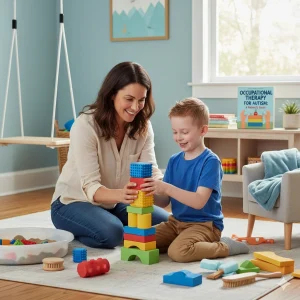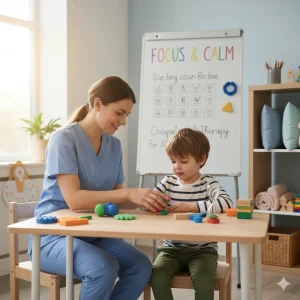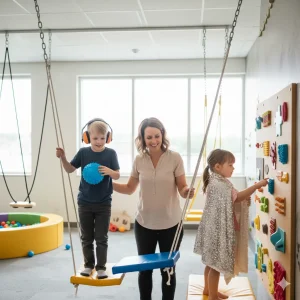Unlock Your Voice: Online Speech Therapy for Aphasia
Last Updated: June 16, 2025
Imagine struggling to find the right words or having difficulty understanding a simple conversation. This is the reality for many people with aphasia, a language disorder that affects communication abilities. Aphasia can occur after a stroke, brain injury, or as a result of other neurological conditions. It impacts speaking, understanding, reading, and writing, making daily interactions challenging.
Fortunately, speech therapy offers a path to improvement. Even better, online speech therapy for aphasia brings numerous benefits that can make the journey smoother and more convenient. Online therapy allows you to receive the necessary treatment from the comfort of your own home, eliminating the need for travel. This is especially beneficial for those in rural areas or with mobility issues. Plus, it offers flexible scheduling, so you can fit sessions into your busy life more easily.
Improve Your Speech Online
Overcome speech challenges and build your voice with expert online therapy. Regain clarity, fluency, and communication strength.
What is Aphasia?
Aphasia is a language disorder that affects a person’s ability to communicate. This condition can make it difficult for individuals to speak, understand spoken words, read, and write. Aphasia often occurs after a stroke, brain injury, or as a result of tumors and neurodegenerative diseases such as Alzheimer’s. When the brain’s language centers are damaged, the ability to process and produce language can be disrupted, leading to various communication challenges.
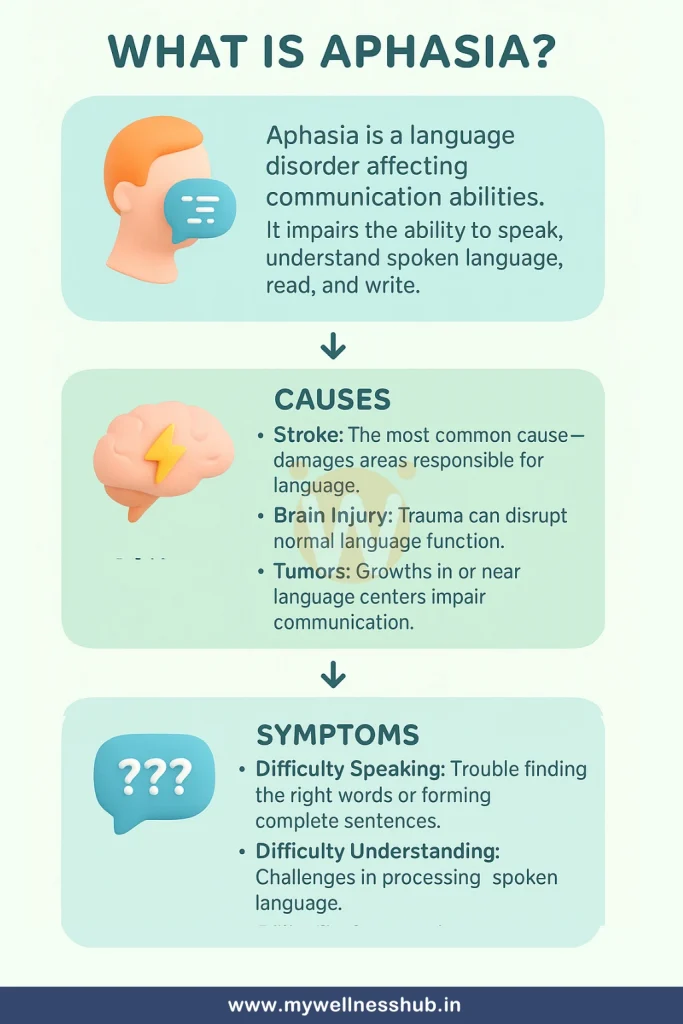
Common causes of aphasia include:
- Stroke: The most frequent cause, a stroke can disrupt blood flow to parts of the brain responsible for language.
- Brain Injury: Trauma from accidents or blows to the head can damage language areas in the brain.
- Tumors: Growing brain tumors can affect language processing regions.
- Neurodegenerative Diseases: Conditions like Alzheimer’s or Frontotemporal Lobar Degeneration can progressively deteriorate the brain’s language functions.
Aphasia impacts several aspects of communication:
- Speaking: Finding the right words or forming sentences can become challenging.
- Understanding: Comprehending spoken language may be difficult, especially in noisy environments or when speech is fast-paced.
- Reading: Individuals may struggle to read books, forms, or digital screens.
- Writing: Writing coherent sentences or even individual words can be problematic.
Understanding the nature of aphasia is the first step in seeking effective treatment. Whether it’s through in-person sessions or the increasingly popular option of online speech therapy, addressing these communication barriers can significantly improve quality of life. Online speech therapy, in particular, offers a flexible and accessible way to receive professional help, making it easier for patients and their families to engage in the recovery process.
Read more: Aphasia: Causes, Symptoms, Types and Treatment
Who Can Get Aphasia?
Aphasia can affect anyone, regardless of age or background, although it is more commonly seen in individuals over the age of 45. This condition arises due to damage in the brain’s language centers, which can occur from various causes such as strokes, brain injuries, tumors, or neurodegenerative diseases.
Statistics highlight the prevalence of aphasia in the U.S.:
- According to the National Aphasia Association, approximately 180,000 Americans acquire aphasia every year.
- Currently, about 1 million people in the United States live with aphasia.
While it is most common among middle-aged and older adults, particularly those who have suffered a stroke, younger individuals can also develop aphasia, especially if they have experienced a traumatic brain injury or have certain medical conditions.
Understanding that aphasia can affect a diverse range of people helps in recognizing the importance of accessible treatment options like online speech therapy. This innovative approach allows individuals from all walks of life to receive the necessary support and care, regardless of their location or mobility challenges.
Common Symptoms of Aphasia
Aphasia manifests in various ways, affecting an individual’s ability to communicate effectively. Here are some common symptoms that people with aphasia may experience:
Difficulty Finding the Right Words
One of the hallmark signs of aphasia is the struggle to find the correct words during a conversation. This can lead to long pauses as the individual searches for the appropriate term. They might describe objects or actions instead of naming them directly, which can be frustrating and time-consuming.
Substituting or Making Up Words
People with aphasia may substitute words with incorrect ones, sometimes saying something that makes little sense in the context. For example, they might say “book” when they mean “phone.” In some cases, they might create new words altogether, which can make their speech difficult to understand.
Trouble Understanding Spoken Language
Understanding what others are saying can also be challenging for those with aphasia. They might struggle more in noisy environments or when conversations are fast-paced. This difficulty can lead to confusion and miscommunication, making everyday interactions more stressful.
Challenges with Reading and Writing
Aphasia can significantly impact literacy skills. Individuals may find it hard to read books, forms, or digital screens, and writing coherent sentences or even individual words can be problematic. This can affect their ability to handle tasks that involve reading and writing, such as filling out forms or sending emails.
Also read: Don’t Let Aphasia Silence You: 6 Effective Recovery Strategies
Types of Aphasia
Aphasia comes in several types, each affecting different aspects of language and communication. Here are some of the most common types of aphasia, along with their symptoms and communication challenges:
Broca’s Aphasia (Non-Fluent Aphasia)
Broca’s aphasia, also known as non-fluent aphasia, primarily affects speech production. Individuals with this type of aphasia often speak in short, broken sentences and may find it challenging to form complete sentences. However, they generally understand spoken language better than they can express it.
Symptoms and Challenges:
- Difficulty forming complete sentences
- Speaking in short phrases or single words
- Omitting small words like “is” or “the”
- Effortful and laborious speech production
- Better comprehension than expression
Wernicke’s Aphasia (Fluent Aphasia)
Wernicke’s aphasia, also known as fluent aphasia, affects the ability to understand spoken language. While individuals with this type can speak in long, complex sentences, their speech often lacks meaning and may include made-up words.
Symptoms and Challenges:
- Speaking in long, meaningless sentences
- Using incorrect or made-up words
- Difficulty understanding spoken language
- Poor comprehension of written text
- Often unaware of their language mistakes
Anomic Aphasia
Anomic aphasia is characterized by difficulty finding the right words, particularly nouns and verbs. Individuals with anomic aphasia may speak fluently but frequently pause to search for the correct words, which can interrupt the flow of conversation.
Symptoms and Challenges:
- Frequent pauses while searching for words
- Using vague terms like “thing” instead of specific words
- Fluent speech but with noticeable word-finding difficulties
- Frustration from not being able to name objects or concepts
Learn more: Understanding Anomic Aphasia: Symptoms, Causes and Support
Global Aphasia
Global aphasia is the most severe form, affecting all aspects of language and communication. Individuals with global aphasia have extensive damage to the brain’s language areas, leading to significant difficulties in speaking, understanding, reading, and writing.
Symptoms and Challenges:
- Limited ability to produce recognizable words
- Severe comprehension difficulties
- Trouble with reading and writing
- Often able to express only a few words or phrases
- Requires comprehensive speech therapy for any improvement
Primary Progressive Aphasia (PPA)
Primary progressive aphasia is a neurological condition where language skills deteriorate over time. Unlike other forms of aphasia caused by stroke or injury, PPA results from progressive brain diseases such as Alzheimer’s or frontotemporal lobar degeneration.
Symptoms and Challenges:
- Gradual loss of language abilities
- Increasing difficulty with speaking, understanding, reading, and writing
- Slow but steady decline in communication skills
- Often the first symptom of a broader neurodegenerative condition
Summary of Aphasia Types
| Type of Aphasia | Key Characteristics | Symptoms |
|---|---|---|
| Broca’s Aphasia | Non-fluent, effortful speech | – Short, broken sentences – Difficulty forming complete thoughts – Omitting small words like “is” or “the” – Better comprehension than expression |
| Wernicke’s Aphasia | Fluent but meaningless speech | – Long, nonsensical sentences – Use of incorrect or made-up words – Poor comprehension of spoken and written language – Often unaware of their language mistakes |
| Anomic Aphasia | Difficulty finding words | – Frequent pauses while searching for words – Use of vague terms like “thing” instead of specific words – Fluent speech but with noticeable word-finding difficulties – Frustration from not being able to name objects or concepts |
| Global Aphasia | Severe impairment in all language | – Limited ability to produce recognizable words – Severe comprehension difficulties – Trouble with reading and writing – Often able to express only a few words or phrases |
| Primary Progressive Aphasia (PPA) | Gradual decline in language skills | – Progressive difficulty with speech and comprehension – Increasing challenges with reading and writing – Slow but steady decline in overall communication skills – Often the first symptom of a broader neurodegenerative condition |
The Role of Speech Therapy in Aphasia Recovery
Speech therapy plays a crucial role in the recovery process for individuals with aphasia. The main goals of speech therapy are to improve communication skills, compensate for language challenges, and enhance the overall quality of life for those affected by this condition.
Goals of Speech Therapy
- Improving Communication Skills The primary objective of speech therapy is to help individuals regain their ability to communicate effectively. This includes improving their ability to speak, understand spoken language, read, and write. By working on these skills, individuals can better express their thoughts and needs.
- Compensating for Language Challenges Speech therapy also focuses on developing strategies to compensate for language difficulties. This might involve learning to use alternative communication methods, such as gestures or visual aids, to convey messages when speaking is difficult. These compensatory strategies are vital in helping individuals maintain effective communication in their daily lives.
- Enhancing Quality of Life Beyond improving communication, speech therapy aims to enhance the overall quality of life for individuals with aphasia. By addressing communication barriers, therapy helps reduce frustration, increase independence, and improve social interactions. This holistic approach ensures that individuals can participate more fully in their personal and professional lives.
Examples of Speech Therapy Activities
Speech therapists use a variety of activities tailored to the specific needs of each individual. Here are some common exercises used in aphasia therapy:
- Repeating Words Practicing word repetition helps reinforce language patterns and improve speech production. This activity is particularly useful for individuals with non-fluent aphasia, such as Broca’s aphasia.
- Naming Objects Therapists may use picture cards or real-life objects to help individuals practice naming items. This exercise aids in word retrieval and vocabulary building, which are essential for effective communication.
- Practicing Conversations Role-playing and simulated conversations are used to improve conversational skills. These activities help individuals practice initiating and maintaining dialogues, responding appropriately, and using non-verbal cues to enhance understanding.
Engaging in these targeted activities under the guidance of a speech therapist can significantly aid in the recovery process. Online speech therapy for aphasia offers the same benefits as in-person sessions, with the added convenience of being accessible from home.
Benefits of Online Speech Therapy for Aphasia
Online speech therapy for aphasia offers numerous advantages that make it an appealing option for many individuals. Here are some key benefits that highlight the convenience, flexibility, and effectiveness of this modern approach to therapy.
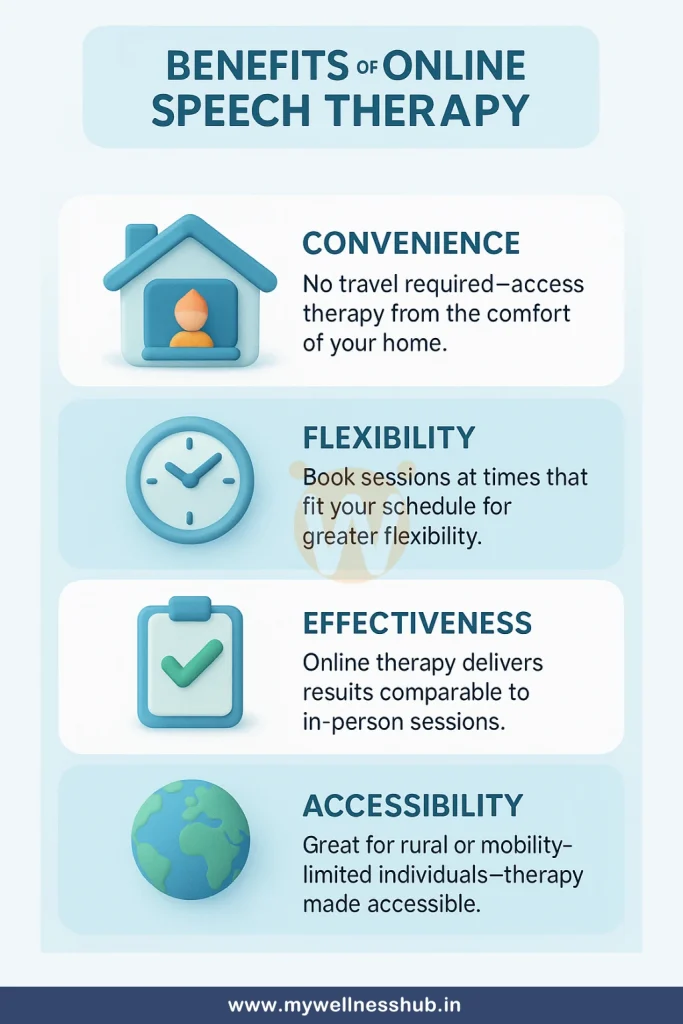
Convenience and Accessibility
One of the biggest benefits of online speech therapy is the convenience it provides. With no need to travel to a clinic, individuals can receive therapy sessions from the comfort of their own homes. This is especially beneficial for those living in rural areas or those with mobility issues who might find it challenging to commute regularly.
By eliminating the need for travel, online therapy reduces the time and effort required to attend sessions, making it easier to stick to a consistent therapy schedule. This increased accessibility ensures that more people can receive the support they need, regardless of their location.
Flexibility in Scheduling Sessions
Online speech therapy offers great flexibility when it comes to scheduling sessions. Traditional in-person therapy often requires patients to fit appointments into their schedules, which can be difficult for those with busy lifestyles or unpredictable routines.
With online therapy, sessions can be scheduled at times that are most convenient for the individual. This flexibility allows patients to balance therapy with other commitments, leading to better participation and more consistent progress.
Proven Effectiveness of Online Therapy
Research has shown that online speech therapy is just as effective as in-person sessions for treating aphasia. Numerous studies have demonstrated that virtual therapy can achieve similar outcomes in improving communication skills and enhancing the quality of life for individuals with aphasia.
The use of video conferencing and digital tools enables speech therapists to provide comprehensive, personalized care. Therapists can observe, interact, and guide patients through various exercises and activities, ensuring that each session is productive and tailored to the individual’s needs.
How Online Speech Therapy Works
Online speech therapy offers a flexible and accessible way to receive treatment for aphasia. Here’s a look at how a typical online therapy session works, how speech therapists personalize therapy plans, and the important role that family and caregivers play in the therapy process.
Description of a Typical Online Therapy Session
A typical online speech therapy session is conducted via video conferencing platforms. Here’s what you can expect:
- Setup and Preparation: Before the session begins, ensure you have a reliable internet connection and a quiet, distraction-free environment. You’ll need a computer, tablet, or smartphone with a camera and microphone.
- Initial Check-In: The session usually starts with a brief check-in where the therapist discusses the goals for the session and reviews any progress or challenges since the last meeting.
- Therapy Activities: The therapist will guide you through various speech therapy activities tailored to your specific needs. These might include:
- Repeating words or phrases
- Naming objects shown in pictures
- Practicing conversational skills through role-playing
- Engaging in reading and writing exercises
- Interactive Feedback: Throughout the session, the therapist provides real-time feedback and adjusts activities based on your responses. This interactive approach helps in addressing any immediate difficulties and reinforcing successful strategies.
- Wrap-Up: At the end of the session, the therapist will summarize what was covered, discuss any homework or practice activities, and schedule the next session.
How Speech Therapists Personalize Therapy Plans
Each individual with aphasia has unique challenges and strengths. Speech therapists personalize therapy plans to meet these specific needs. Here’s how they do it:
- Initial Assessment: The process begins with a comprehensive assessment to understand the individual’s specific communication difficulties. This may involve standardized tests, interviews, and observation.
- Goal Setting: Based on the assessment, the therapist works with the patient to set realistic and meaningful goals. These goals focus on improving communication skills and enhancing the individual’s ability to participate in daily activities.
- Customized Activities: The therapist designs activities and exercises tailored to the individual’s needs. For example, if someone struggles with word retrieval, the therapist might focus on exercises that improve naming skills.
- Continuous Adjustment: Therapy plans are not static. Therapists continuously monitor progress and adjust activities and goals as needed to ensure the individual is making the best possible progress.
Role of Family and Caregivers in the Therapy Process
Family and caregivers play a crucial role in supporting the individual with aphasia. Here’s how they can be involved:
- Participation in Sessions: Family members and caregivers are often encouraged to participate in online therapy sessions. This helps them understand the therapy process and learn strategies to support their loved one.
- Home Practice: Therapists often assign practice activities to be done at home. Family members can assist by ensuring these exercises are completed and providing encouragement and support.
- Communication Strategies: Therapists teach family members effective communication strategies to use in daily interactions. This might include speaking slowly, using simple sentences, and providing visual aids.
- Emotional Support: Living with aphasia can be frustrating and challenging. Family and caregivers provide essential emotional support, helping to boost the individual’s confidence and motivation.
Online speech therapy provides a comprehensive and flexible approach to aphasia treatment, ensuring that individuals receive personalized care in a convenient and supportive environment.
Tips for Supporting Someone with Aphasia
Supporting a loved one with aphasia can make a significant difference in their recovery and quality of life. Here are some practical tips to help you communicate more effectively and provide the best support:
Speak Slowly and Use Simple Sentences
When talking to someone with aphasia, it’s important to slow down your speech and use simple, clear sentences. This gives them more time to process what you’re saying and reduces the likelihood of confusion. Avoid using complex words or long sentences that might be difficult to understand.
Give Them Time to Respond
Patience is key when communicating with someone who has aphasia. Give them ample time to respond without interrupting or finishing their sentences for them. Rushing them can cause frustration and anxiety, so it’s essential to create a calm and supportive environment.
Use Visual Aids and Gestures
Visual aids and gestures can enhance understanding and make communication easier. Pointing to objects, using pictures, or making hand gestures can help convey your message more effectively. These tools can be especially useful when words alone are not enough.
Minimize Background Noise and Distractions
Creating a quiet environment with minimal background noise can significantly improve communication. Turn off the television, radio, and other distracting sounds during conversations. A calm setting helps the person with aphasia focus better on the conversation and reduces the strain of trying to understand over background noise.
Continue Recommended Exercises at Home
Following through with speech therapy exercises at home is crucial for progress. Work with the speech therapist to understand the recommended exercises and practice them regularly. Consistent practice helps reinforce skills learned during therapy sessions and promotes steady improvement.
How Wellness Hub Can Help
At Wellness Hub, we understand the unique challenges faced by individuals with aphasia and their families. Our online speech therapy services are designed to provide comprehensive support tailored to each person’s needs, helping them unlock their communication potential from the comfort of their own home.
Expertise of Certified Speech Therapists
Our team of certified speech therapists at Wellness Hub brings a wealth of experience and specialized knowledge in treating aphasia. Each therapist is highly trained to address the various forms of aphasia and to develop effective treatment plans that cater to the individual needs of our clients. Their expertise ensures that each therapy session is productive, engaging, and focused on achieving tangible improvements in communication skills.
Personalized Approach
We believe that every person with aphasia is unique, which is why we offer a personalized approach to speech therapy. During the initial assessment, our therapists conduct a thorough evaluation to understand the specific challenges and goals of each client. Based on this assessment, a customized therapy plan is created that includes targeted exercises and activities designed to address the individual’s specific needs.
This personalized approach ensures that therapy is relevant and effective, providing the best possible outcomes for our clients. Whether it’s improving word retrieval, enhancing conversational skills, or developing alternative communication strategies, our tailored plans are aimed at maximizing progress and helping individuals regain their confidence.
Ongoing Support
Support from Wellness Hub extends beyond the therapy sessions. We provide continuous guidance and resources to ensure that progress is maintained. Our therapists work closely with family members and caregivers, teaching them strategies to support their loved one’s communication efforts at home. This collaborative approach helps reinforce the skills learned during therapy and fosters a supportive environment for continuous improvement.
Additionally, our online platform offers the convenience of scheduling sessions at times that work best for you, eliminating the need for travel and making it easier to integrate therapy into your daily routine. With Wellness Hub, you have access to professional support whenever and wherever you need it.
Conclusion
At Wellness Hub, we know how tough aphasia can be for both individuals and their families. Our online speech therapy services are here to help. Our certified speech therapists are experienced in treating aphasia and create personalized treatment plans for each person. This ensures that every session is focused on making real improvements in communication skills, all from the comfort of your own home.
We believe that every person with aphasia is unique. During the initial assessment, our therapists learn about each client’s specific challenges and goals. They then create a customized therapy plan with targeted exercises and activities. Our support goes beyond just the therapy sessions—we also provide guidance for families and caregivers to help reinforce skills at home. This teamwork helps foster continuous improvement. For more information on how Wellness Hub can help with aphasia recovery, visit our Online Speech Therapy page.
Frequently Asked Questions:
1. What is aphasia?
Aphasia is a language disorder that affects a person’s ability to communicate. It can impact speaking, understanding spoken language, reading, and writing. Aphasia often occurs after a stroke or brain injury but can also result from tumors or neurodegenerative diseases.
2. How does online speech therapy work for aphasia?
Online speech therapy uses video conferencing to connect individuals with certified speech therapists. During sessions, therapists guide patients through customized activities and exercises to improve their communication skills. This approach offers the same benefits as in-person therapy with the added convenience of being at home.
3. Is online speech therapy as effective as in-person therapy for aphasia?
Yes, research has shown that online speech therapy can be just as effective as in-person sessions. The key is the personalized approach, which allows therapists to tailor the treatment to the individual’s specific needs, ensuring effective outcomes.
4. Who can benefit from online speech therapy for aphasia?
Anyone with aphasia can benefit from online speech therapy, especially those who have difficulty traveling to a clinic or live in rural areas. It’s suitable for individuals of all ages who need support in improving their communication skills.
5. What are the benefits of online speech therapy for aphasia?
Online speech therapy offers several benefits, including convenience (no travel required), flexibility in scheduling, and proven effectiveness. It also allows for greater involvement of family members and caregivers in the therapy process.
6. What kind of activities are included in online speech therapy sessions?
Activities in online speech therapy may include repeating words, naming objects, practicing conversations, and engaging in reading and writing exercises. These activities are tailored to address the specific needs and goals of the individual.
7. How can family members support someone undergoing online speech therapy for aphasia?
Family members can support their loved ones by participating in therapy sessions, practicing recommended exercises at home, using visual aids and gestures to enhance communication, and minimizing background noise during conversations.
8. How do I get started with online speech therapy at Wellness Hub?
To get started with online speech therapy at Wellness Hub, visit our Online Speech Therapy page and schedule an initial assessment. Our certified therapists will work with you to create a personalized treatment plan that meets your specific needs.
9. What makes Wellness Hub’s online speech therapy unique?
Wellness Hub’s online speech therapy is unique because of our personalized approach, the expertise of our certified speech therapists, and the ongoing support we provide to both patients and their families. We focus on creating customized therapy plans that ensure effective and meaningful improvements in communication skills.
10. Can children with aphasia also benefit from online speech therapy?
Yes, children with aphasia can greatly benefit from online speech therapy. Our therapists at Wellness Hub tailor the activities and exercises to suit the needs of children, helping them improve their communication skills in a supportive and engaging environment.
About the Author:
Anuradha Karanam
Speech-language pathologist (7+ years of experience)
Anuradha Karanam is a skilled speech-language pathologist with over 6 years of experience. Fluent in Tamil, Telugu, Hindi, and English, she specializes in parent counseling, speech sound disorders, fluency assessment, and speech-language evaluations. Anuradha excels at working with children with developmental disorders, offering creative and effective therapy programs. Currently, at Wellness Hub, she holds a BASLP degree and is registered with the RCI (CRR No A85500). Her patience, ambition, and dedication make her a trusted expert in her field.
Connect with Anuradha to learn more about how she can help you or your loved one find their voice.
Book your Free Consultation Today
Parent/Caregiver Info:
Client’s Details:
* Error Message




